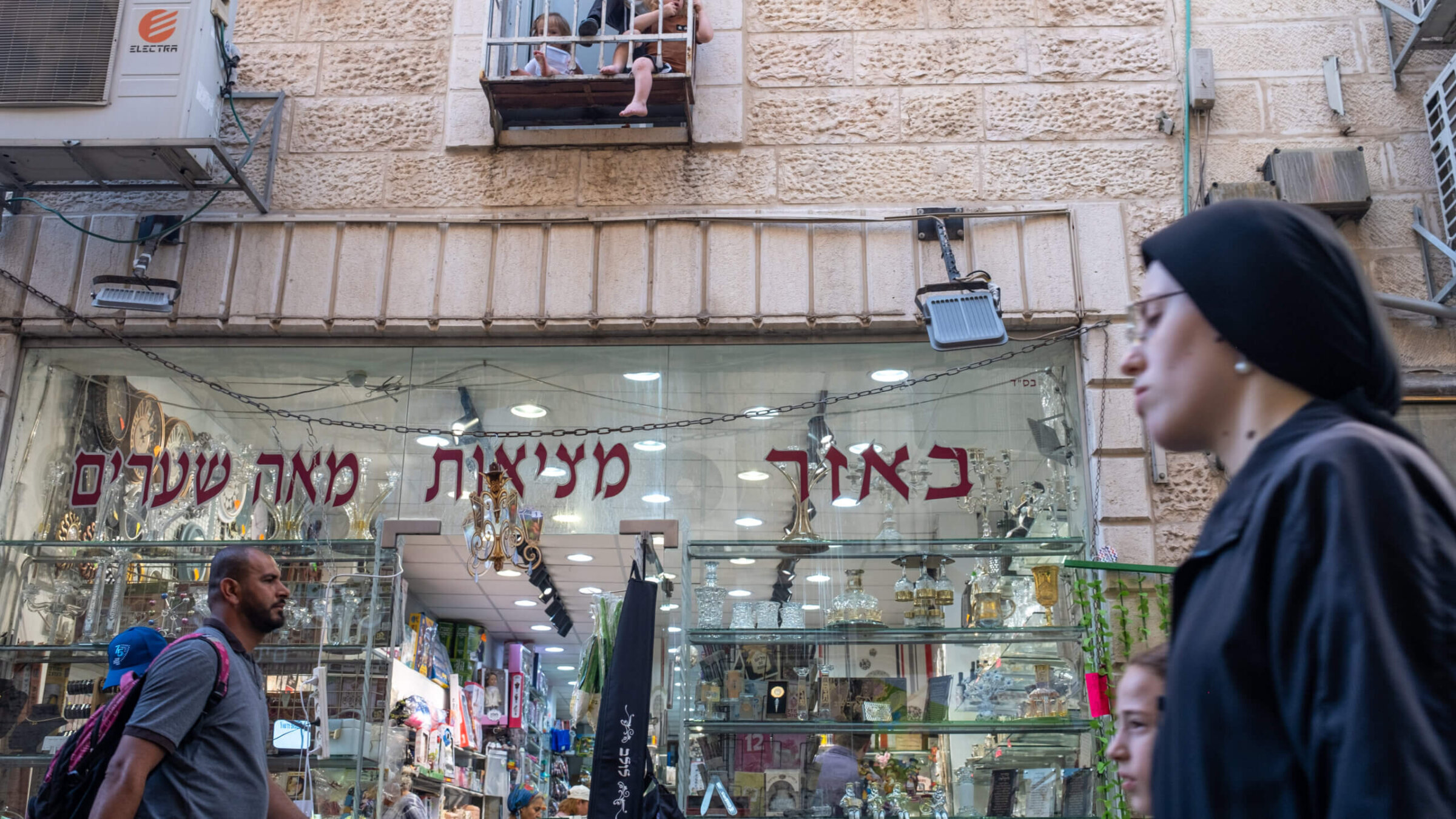There is a well of untapped solidarity between progressive Jews and Haredim after Oct. 7
The two communities have a lot more in common than one might think

A secular Jewish man and a Haredi woman walk in the Haredi neighborhood of Mea Shearim in Jerusalem, Sept. 27 2023. Photo by Alexi Rosenfeld
A quick Google search of “Haredim” during the war yields complicated results. Articles about Haredi men defacing posters of female hostages stand alongside reports of the refreshing increase in conscription numbers. Despite moments of unity and brotherhood, fears over Israel’s future remain significant. How can we tip the scale toward true solidarity?
The history of Zionism and Orthodox Judaism can help us understand the origins of divisiveness between progressive and religious Jews as well as our overlooked commonalities. Even with our differences, the unexamined values we share can provide a foundation for greater understanding and compassion between us.
History can be a powerful tool for improving cross-cultural dialogue — something I realized as an Orthodox Jew in academic environments. Raised secular in Michigan by Israeli immigrants, I became observant while majoring in women’s studies in college. During this time, both my Jewish and non-Jewish peers began to see me as intolerant, prejudiced and, therefore, no longer like them.
By the time I reached graduate school, I was well-acquainted with criticism of Orthodox Judaism. I continued to experience condescension from my peers and professors — a surreal experience while researching the history of left-wing antisemitism — but I also had several professors who engaged with me.
These professors granted me space to critique left-wing political thought. To explore how liberal and socialist intellectuals shaped modern conceptions of “enlightened” versus “unenlightened” Jews. In granting me this freedom they earned my trust while challenging me to question my own assumptions. The authenticity of our exchanges not only fostered mutual respect and learning, but helped illuminate what progressive and religious Jews had in common historically: They were both outsiders.
In the late 19th and early 20th century, socialist Zionist and Orthodox Jewish groups were both seen as “problematic Jews.” Liberal and socialist intellectuals were hostile to their Jewish populations as a “fifth column,” writing extensively on the inferiority of the Jewish faith and race and the threat they posed to the “universal” values of non-Jews. In both European and, later on, Arab states, Jew were thus presented with an ultimatum: Either leave your old nation behind for your new one, or forgo your rights, citizenship and safety.
Any tradition that connected Jews to their own land and nationhood became increasingly taboo, whether their use of Jewish diasporic languages, expressions of messianic longing, or tradition of giving tzedakah (donations) to support diaspora Jews’ emigration to Israel. The mere suspicion of disloyalty could result in violent, collective punishment. Despite this, socialist Zionist and Orthodox Jews refused to accept the dismantlement of Jewish nationhood and remained proud of their people.
“Good Jews” were expected to feel ashamed of their differences, not proud. In Portrait of a Jew, Tunisian Jewish writer Albert Memmi describes the predicament Jews faced in having to convince non-Jews of their common humanity.
“To me there is nothing more intolerable, more humiliating than the memory of certain Jewish appeals to [non-Jews]: ‘We are all alike, aren’t we?’ Does a French or an English socialist, exponent of international union, need to deny the characteristics of his people?”
Instead, Memmi insists, “difference is the condition requisite to all dignity and to all liberation.”
While Zionists and Orthodox Jews both embraced Jewish difference, profound tensions remained between them. Zionist perceptions of Orthodox Jews mirrored non-Jewish perceptions of Zionist Jews: archaic, corrupt and tribal.
In reflecting back on this history, progressive Israelis must realize that their judgments of Haredim have been heavily shaped by non-Jewish conceptions of unassimilated Jews as a danger to their “universal” values. Secular political ideals have significantly impacted Haredim by rendering them a threat to the public sphere and its protection of “liberated” Israelis. The burdens, distress and humiliation religious Jews experience vis-à-vis secular social norms and prejudices have yet to be properly understood.
On the other hand, Haredim must recognize that their progressive counterparts are far from apathetic toward their Jewish identity. Progressive Israelis possess a rich legacy of protecting the dignity and safety of their people at all costs. Not only is their Jewish pride dismissed, but their history of fighting for all Jews’ access to their homeland remains gravely overlooked.
Despite our differences, the shared grief we’ve experienced can serve as an impetus to appreciate one another’s unique contributions to our people and country, regardless of how we each decide to vote at the end of the day. Or is total political unity a prerequisite to building empathy, respect and admiration between us? Given how much we share as the proud guardians of “Jewish difference,” I would venture to say that it’s not.
To contact the author, email [email protected].
























